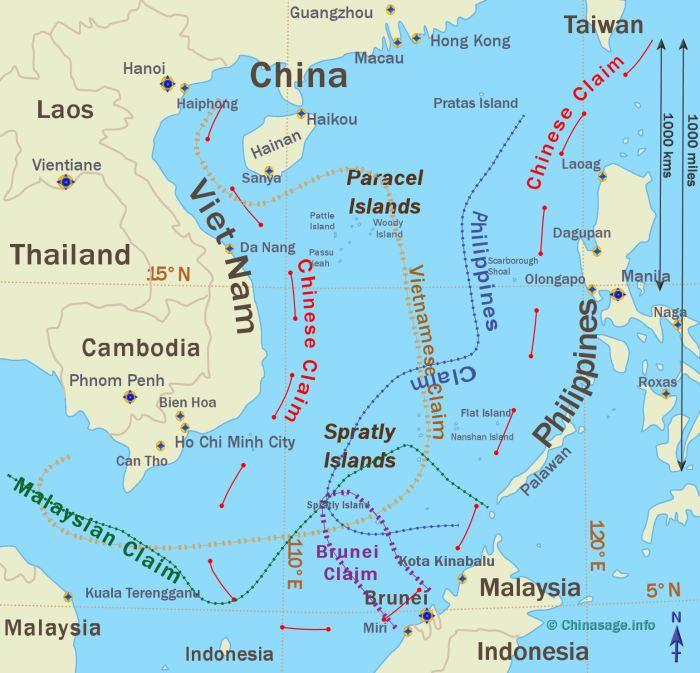
By Earnest Adesoji
The issue of freedom of navigation across the South China Sea became murkier recently, as China passed a new Maritime Traffic Safety Law on 29th August 2021.
This law, which came into effect on 1st September 2021, asserts that China will require a range of vessels “to report their information” when passing through what the country deems as its “territorial waters”, most of which are currently embroiled in disputes.
The Maritime Safety Administration in China has stated that the incoming vessels must provide ship and cargo information, which include their name, call sign, current position next port of call, and the estimated time of arrival. Their notice, dated 27th August, also mentioned that the reporting requirements applied to submersibles, nuclear vessels, ships carrying radioactive materials, ships carrying bulk oil, chemicals, liquefied gas and other toxic and harmful substances, as well as other vessels that may be seen as ‘threat’ to the country’s maritime safety. They also have warned that the Maritime Safety Administration “has the power to dispel or reject a vessel’s entry to Chinese waters if the vessel is found to pose threat to China’s national security.”
The notice, however, failed to mention how it will enforce these provisions, only that the ‘law’ will be applied. The Maritime Traffic Safety Law itself is also ambiguous about the mechanism for enforcement of the regulations it pertains to. This has led to this new law being compared to the 2013 Air Defense Identification Zone (ADIZ) declaration that China had made over the East China Sea.
In general, ADIZ are used for identifying, locating and controlling aircraft for security purposes, though they have no legal basis in international statutes, nor do they count as airspace territories of the country themselves. In the particular case of China, the ADIZ had intended to mandate identification of all foreign aircraft, even in international airspace, to Chinese authorities.
However, little was done to enforce the ADIZ, especially recently. In view of this, experts such as Collin Koh, a research fellow from the S. Rajaratnam School of International Studies in Singapore, have expressed doubts if China will be enforcing this edict as well. According to Koh, while some parties may comply, the ‘biggest and most consequential’ actors will not do so. This includes countries that have territorial waters disputes with China in the South China and East China seas, and larger Western nations such as the US and UK that have rejected Chinese territorial claims.
There is also some division of opinion regarding the move within China. The diplomatic and legal experts in China are unsure if the new rules are feasible in terms of implementation. Some experts have also called the move a “legal gesture by Beijing to “advocate and consolidate our claims”. However, Yu Mincai, an international law expert with Renmin University believes that the new rules could ‘strengthen navigation security and environmental protection.’
China has multiple territorial disputes with Japan and South-East Asian countries in the matter of maritime borders in the East and South China Sea. China insists on a ‘historic’ claim over a vast majority of these seas which exceeds the 12 nautical miles (22.2 km) stipulated as Exclusive Economic Zones (EEZ) by the United Nations Convention on the Law of the Sea (UNCLOS). China has also been constructing artificial islands and amping up its naval presence in a bid to push its EEZs further. All these actions were done in direct defiance of the 2016 ruling by an international tribunal, that had deemed Chinese claims and actions in the South China Sea violative towards UNCLOS.
While the above arguments do indicate that the new rules are largely meant as political messaging, the threat posed by China cannot be denied. There have been several recent incidences where China has deployed their navies as a way to intimidate the claimant nations, as seen by the recent 200 naval ships patrolling close to Philippines borders around Whitsun reef this April. Earlier this year, Beijing had passed another law that explicitly allowed its coast guard to fire on foreign vessels.
Additionally, Kang Lin, a deputy director of China’s National Institute for South China Sea Studies, believes that while this regulation does not detail penalties for non-compliance, maritime administration would deal with breaches according to relevant laws, including the coastguard law. Read together, this paints a disturbing picture where China will be able to restrict the navigation of ships just by the promise of sinking them in case of non-compliance to its arbitrary rules.
There is thus a sense of urgency rising with respect to Chinese expansionism, given that these disputed waters have both geostrategic as well as economic importance, not in the least because of the maritime resources and shale deposits that they might have.
The South China Sea alone carries over $3 trillion worth of trade, constituting about 20% to 33% of global trade volume, and leaving their fate to China’s whims will likely have global repercussions.
At present, it is clear that the new rules being China’s way of making a political statement are a more optimistic scenario.
Earnest Adesoji is a current affairs analyst from Lagos, Nigeria
Disclaimer
Comments expressed here do not reflect the opinions of Vanguard newspapers or any employee thereof.